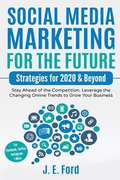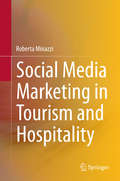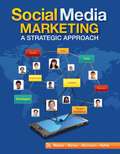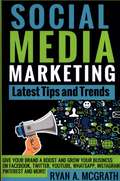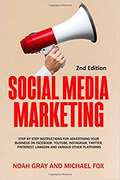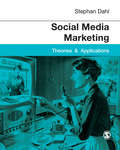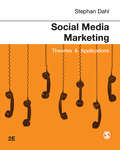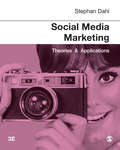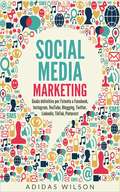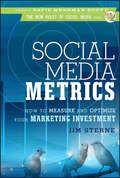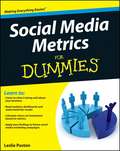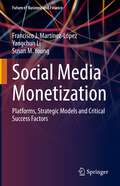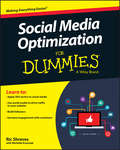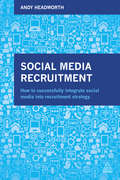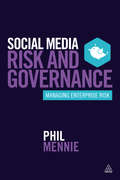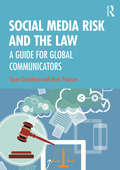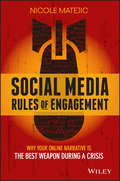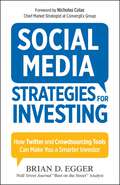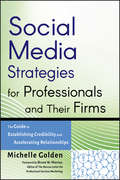- Table View
- List View
Social Media Marketing for the Future: Strategies for 2020 and Beyond
by J. E. Ford<p>Social media marketing is not an option anymore. Your customers—no matter who they are—expect you to reach them the way they communicate. The vast majority of companies have inadequate social media marketing strategies. Most companies are playing catch-up with current digital marketing trends and their strategies will be outdated by the time the company has mastered them. <p>To successfully market on social media, you need to be prepared for the future. Social media changes rapidly and frequently. <p>This book will teach you: <p> <li>The most important social media trends to expect for the next years and beyond <li>How to apply perennial marketing principles to new mediums and technologies <li>How to understand and reach new customer profiles and the new generation of social media: Gen Z <li>New government regulation and privacy trends that will affect your marketing efforts</li> <p> <p>This book discusses: <p> <li>The future of Facebook, Instagram, Twitter, Snapchat, YouTube and more, and how to harness their power to build your brand and gain customers <li>New social networks that are on the rise and may become major contenders <li>Technological trends that are redefining the rhythm of social media <li>How to utilize new technology and tools to strengthen your brand and achieve a competitive edge.</li> <p> <p>If your marketing plan is focused only on today’s trends, you’ve already lost. Plan for tomorrow. Beat out the competition. Reach your customers where they are. <p>The future is here. Are you ready?</p>
Social Media Marketing in Tourism and Hospitality
by Roberta MinazziThis book describes ongoing developments in social media within the tourism and hospitality sector, highlighting impacts on both the demand and the supply side. It offers a combination of theory and practice, with discussion of real-life business experiences. The book is divided into three parts, the first of which provides an overview of recent trends in social media and user-generated content, clarifies concepts that are often used in an overlapping way and examines the "digitization of word of mouth" via online networks. The second part analyzes the impacts that social media can have on traveler behavior for each step in the travel process and also on suppliers, highlighting opportunities, threats and strategies. In the third part of the book, future potential trends deriving from the mobile marketing technologies are explored and possible methods for social monitoring by means of key performance indicators are examined. It is considered how engaging customers and prospects by means of social media might increase customer loyalty, foster electronic word-of-mouth communication, and consequently have important effects on corporate sales and revenues. The discussion encompasses methods to measure company performance on each of the social media in order to understand the optimal mix that will support and improve business strategies.
Social Media Marketing: A Strategic Approach
by Melissa Barker Donald I. Barker Nicholas F. Bormann Krista E. NeherSocial Media Marketing: A Strategic Approach promises to be the seminal textbook in the field with its distinctive conceptual foundation and practical approach to developing successful social media marketing plans. A proven eight-step social media planning model provides students with a cumulative learning experience, showing them how to construct social media strategies that achieve desired marketing goals.
Social Media Marketing: Facebook Marketing, Youtube Marketing, Instagram Marketing
by Mark SmithCreate Amazing Business Opportunities And Reach More Followers Using the Power of The Social Media! This Box Set Includes 3 Books - Facebook Marketing, Youtube Marketing, Instagram Marketing.
Social Media Marketing: Latest Tips and Trends, Give your brand a boost and grow your business on Facebook, Twitter, YouTube, WhatsApp, Instagram, Pinterest and more
by Ryan A McGrathDid you know that as of November 2018 there are 3 billion people around the world who use social media every month which translates to more than 34% penetration? Did you also know that there are 1 million new active mobile users added every day? In 2018, about 61% of small businesses invest.
Social Media Marketing: Step by Step Instructions for Advertising Your Business on Facebook, Youtube, Instagram, Twitter, Pinterest, Linkedin and Various Other Platforms (Second Edition)
by Noah GrayThis book covers a lot of Social Media Platforms: Facebook, Facebook Advertising, Youtube, Instagram, Twitter, Pinterest, Linkedin, Snapchat, Reddit, Tumblr, Quora, Goodreads, Periscope, Flickr, Google Adwords, Google+. If you are ready to improve your business through social media marketing, this book will provide you with everything you need.
Social Media Marketing: Theories and Applications
by Stephan DahlSocial media has quickly become part of the fabric of our daily lives, and as we have flocked to it, so have most companies and organisations from every sector and industry. It is now the place to attract and sustain our attention. But how is it a new marketing activity and how is it similar to previous practice and customer behaviour? Does it require new modes of thinking about human networks and communications or do the existing conceptual models still apply? This book offers a critical evaluation of the theoretical frameworks that can be used to explain and utilise social media, and applies them to fun real-life examples and case studies from a range of industries, companies and countries. These include Unilever, Snickers, American Express, Volkswagen and Amnesty International, and span campaigns run across different platforms in countries such as China, Canada, Sweden and Singapore. Readers are invited to think about the different types of social media users and explore topics such as brand loyalty, co-creation, marketing strategy, measurement, mobile platforms, privacy and ethics. As well as tracing the emergence and trends of Web 2.0 and what they mean for marketing, the author also considers the future for social media marketing. Discussion questions and further reading are provided throughout, and the book is accompanied by a companion website.
Social Media Marketing: Theories and Applications
by Stephan DahlSocial media has quickly become part of the fabric of our daily lives, and as we have flocked to it, so have most companies and organisations from every sector and industry. It is now the place to attract and sustain our attention. But how is it a new marketing activity and how is it similar to previous practice and customer behaviour? Does it require new modes of thinking about human networks and communications or do the existing conceptual models still apply? This book offers a critical evaluation of the theoretical frameworks that can be used to explain and utilise social media, and applies them to fun real-life examples and case studies from a range of industries, companies and countries. These include Unilever, Snickers, American Express, Volkswagen and Amnesty International, and span campaigns run across different platforms in countries such as China, Canada, Sweden and Singapore. Readers are invited to think about the different types of social media users and explore topics such as brand loyalty, co-creation, marketing strategy, measurement, mobile platforms, privacy and ethics. As well as tracing the emergence and trends of Web 2.0 and what they mean for marketing, the author also considers the future for social media marketing. Discussion questions and further reading are provided throughout, and the book is accompanied by a companion website.
Social Media Marketing: Theories and Applications
by Stephan DahlThe Second Edition of this text maintains a scholarly approach, providing students with an up-to-date understanding of both the theory and practice of social media marketing, whilst taking a thorough refreshment of the cases, examples and the literature. It offers a critical evaluation of the theoretical frameworks that can be used to explain and utilise social media, providing discussion questions and further reading throughout. Readers are invited to think about the different types of social media users and explore topics such as brand loyalty, co-creation, marketing strategy, measurement, mobile platforms, privacy and ethics. As well as tracing the emergence and trends of Web 2.0 and what they mean for marketing, the author also considers the future for social media marketing. The book is supported by real-life examples and case studies from a range of industries, companies and countries such as China, Canada, Sweden and Singapore. They include DHL (Germany), Dubai Foundation for Women and Children, Google (Taiwan), Addict Aide (France) Canada (opera Vancouver), Britain (British Tourism), Procter & Gamble (Global), Maggi (India), McDonalds (Global), eBags (US/Global), Vodafone (Romania). Online resources for this book are available here Suitable for Marketing, Advertising or Media students taking classes on social media or digital marketing at upper undergraduate, Masters or Doctoral level.
Social Media Marketing: Theories and Applications
by Stephan DahlThe Second Edition of this text maintains a scholarly approach, providing students with an up-to-date understanding of both the theory and practice of social media marketing, whilst taking a thorough refreshment of the cases, examples and the literature. It offers a critical evaluation of the theoretical frameworks that can be used to explain and utilise social media, providing discussion questions and further reading throughout. Readers are invited to think about the different types of social media users and explore topics such as brand loyalty, co-creation, marketing strategy, measurement, mobile platforms, privacy and ethics. As well as tracing the emergence and trends of Web 2.0 and what they mean for marketing, the author also considers the future for social media marketing. The book is supported by real-life examples and case studies from a range of industries, companies and countries such as China, Canada, Sweden and Singapore. They include DHL (Germany), Dubai Foundation for Women and Children, Google (Taiwan), Addict Aide (France) Canada (opera Vancouver), Britain (British Tourism), Procter & Gamble (Global), Maggi (India), McDonalds (Global), eBags (US/Global), Vodafone (Romania). Online resources for this book are available here Suitable for Marketing, Advertising or Media students taking classes on social media or digital marketing at upper undergraduate, Masters or Doctoral level.
Social Media Marketing: Theories and Applications
by Stephan DahlHelping you make the connections between the theory and practice of social media marketing, this third edition of the popular text has been updated to include technological advances in practice such as AI and virtual marketing, alongside a brand-new chapter on the rise of influencer culture and marketing. Examples and case studies throughout help you to contextualise the text through popular brands and platforms such as Instagram, Dunkin Donuts, Amazon and also political marketing for social movements such as Extinction Rebellion. This text is essential reading for all marketing students, researchers and practitioners today.
Social Media Marketing: Theories and Applications
by Stephan DahlHelping you make the connections between the theory and practice of social media marketing, this third edition of the popular text has been updated to include technological advances in practice such as AI and virtual marketing, alongside a brand-new chapter on the rise of influencer culture and marketing. Examples and case studies throughout help you to contextualise the text through popular brands and platforms such as Instagram, Dunkin Donuts, Amazon and also political marketing for social movements such as Extinction Rebellion. This text is essential reading for all marketing students, researchers and practitioners today.
Social Media Marketing: guida definitiva per l'utente su Facebook, Instagram, YouTube, Blogging, Twitter, LinkedIn,
by Adidas WilsonCosa si intende quando si parla di coinvolgimento sui Social Media? La risposta è semplice: è il numero di condivisioni, Mi piace e commenti. Sicuramente, avere un grande seguito è fantastico, ma bisogna ricordare che è sempre meglio puntare alla qualità che alla quantità e un pubblico impegnato è meglio di uno grande. Esistono alcune metriche utilizzate per misurare il coinvolgimento sui Social Media tra i quali: l’uso di hashtag brandizzati, le menzioni, i click-through, la crescita dei follower, i “Mi piace”, i Commenti, i Retweet e le condivisioni. I tuoi follower possono iniziare a interagire con i tuoi contenuti in maniera naturale. Ma spesso, potresti dover incoraggiarli un po'. Ci sono alcuni trucchi che possono aiutarti a raggiungere tale obiettivo. Valuta il tuo coinvolgimento: guarda quanti follower hai, il numero medio di condivisioni e commenti che ricevi su ogni post e qualsiasi altro numero rilevante. Assicurati di continuare a monitorare questi numeri. Scegli la tua strategia: ogni azienda ha obiettivi diversi e le strategie sono, quindi, diverse. La tua strategia dipenderà dai tuoi obiettivi. Potrebbe essere educare il pubblico, raccogliere feedback, cambiare la percezione del pubblico, ecc. Comprendi il tuo pubblico: non è facile coinvolgere persone che non conosci.
Social Media Metrics
by Jim SterneThe only guide devoted exclusively to social media metrics Whether you are selling online, through a direct sales force, or via distribution channels, what customers are saying about you online is now more important than your advertising. Social media is no longer a curiosity on the horizon but a significant part of your marketing mix. While other books explain why social media is critical and how to go about participating, Social Media Metrics focuses on measuring the success of your social media marketing efforts. Success metrics in business are based on business goals where fame does not always equate to fortune. Read this book to determine: Why striving for more Twitter followers or Facebook friends than the competition is a failing strategy How to leverage the time and effort you invest in social media How to convince those who are afraid of new things that social media is a valuable business tool and not just a toy for the overly-wired Knowing what works and what doesn't is terrific, but only in a constant and unchanging world. Social Media Metrics is loaded with specific examples of specific metrics you can use to guide your social media marketing efforts as new means of communication.
Social Media Metrics For Dummies
by Leslie PostonDiscover how to gauge your online success based on social media metricsWith so many social media monitoring and measurement tools available, it can be overwhelming to figure out which tool is right for you when it comes to calculating the success of your social media marketing efforts. This fun and friendly guide helps you determine which tool will serve you best for understanding your online audience.You'll learn to sift through all the information available about social media monitoring and metrics so that you can listen to what is being said about your business, read your analytic dashboard, understand what metrics mean for you, calculate your return on investment (ROI), and apply your findings to future social media marketing campaigns.Helps you wade through the plethora of social media monitoring and metrics to discover what elements are most applicable to your needsExplains the meaning behind the social media metrics tools so that you can understand how to make those results work for youShares examples of how to calculate both the financial and non-financial return on investment of your social media effortsIncludes real-world case studies that demonstrate how small and large businesses are using social media metricsWith this helpful book by your side, you will learn how to understand the information you acquire regarding your social media marketing efforts and then put that information to work for your business.
Social Media Monetization: Platforms, Strategic Models and Critical Success Factors (Future of Business and Finance)
by Francisco J. Martínez-López Yangchun Li Susan M. YoungSocial media initiatives, when effectively used and correctly monetized, can engage customers better and provide higher ROI rates than traditional marketing and sales initiatives. This book presents a selection of monetization strategies that can help companies benefit from social media initiatives and overcome the current challenges in connection with generating and growing revenues. Using cases and examples covering several social media platforms, the authors describe a variety of strategies and holistic solutions for companies. In addition, the book highlights the latest social media innovations, best business practices, successful monetization cases, and strategic trends in future social media monetization.Top executives need to read this book to have a big picture of corporate-wide “social strategy,” form a “social mindset,” and infuse a “social gene” into their company’s culture, strategy, and business processes. Armed with these social elements, companies can gain confidence, effectively introduce social media tools, and invest in major social media initiatives. Due to changing consumer behavior, social media is also ideal for building and sustaining quality relationships with customers – which is why it is becoming an indispensable element in today’s business.
Social Media Optimization For Dummies
by Ric Shreves Michelle KrasniakOptimize, optimize, optimize to get the most out of your company's social media presence As it turns out, social media is good for a lot more than funny cat videos, memes, and sharing what you're eating for lunch with the world. As the social media sphere continues to grow and be redefined, it's more important than ever to arm yourself with the latest information on how you can use it to drive traffic to your website, raise awareness of your brand, and promote your products or services. If you're a marketer who has asked yourself how you can possibly stay afloat in these newly chartered and oft overcrowded waters, Social Media Optimization For Dummies serves as your roadmap to smart marketing in the digital age. So, what is Social Media Optimization (SMO), exactly? Well, it's comprised of two closely related practices. First, SMO refers to a set of techniques in which social media is used to drive traffic to a website and create an interest in a product or service. Second, SMO concerns the optimization of the social media presence itself with the goal of building followers, increasing engagement, and, again, generating interest in a product or service. Each of these parts supports the other and, when the channels are managed efficiently, enhances the other's effectiveness. In this plain English, easy-to-follow guide, you'll quickly discover how to apply SMO practices to your marketing plan to accomplish those goals. Integrate social media into your website Drive traffic to your website Build followers and generate a buzz Increase engagement with customers From integrating social media into your website to building your social media presence to everything in between, Social Media Optimization For Dummies points your business toward success.
Social Media Recruitment
by Andy HeadworthIn order to attract the right people into your organization despite a global shortfall of talented candidates, new methods are now needed to reach future talent. Social media needs to become a vital part of any recruitment strategy. Social Media Recruitment combines practical guidance with case studies and insights from industry thought leaders to provide a full understanding of what social media means for HR and recruitment and how to successfully integrate and use it. It covers the essentials from the beginning to the end of the process, including employer branding, interviewing and onboarding, and how to assess the ROI of the social media recruitment strategy. Ideal for all HR and recruitment professionals, and anyone responsible for talent strategy, this practical guide focuses on devising and implementing a social media recruitment strategy that works for your organization and is aligned with your recruitment objectives.
Social Media Risk and Governance
by Phil MennieFew topics are as pressing to policy makers, business leaders and the risk management community as the secure and compliant management of social media. Social Media Risk and Governance is a practical guide to the components and considerations which make up a good social media governance strategy, spanning both external communications channels such as Facebook, Twitter and LinkedIn, as well as enterprise social networks within an organization. Written by social media risk and governance expert Phil Mennie, Social Media Risk and Governance addresses the concepts professionals in information security, marketing, compliance and risk management need to take into account in their daily practice, guiding us through policy evaluation, planning on social media, information security and fraud risks, how to respond to a crisis or to archive data and more. Featuring examples from companies such as BP, MasterCard, Netflix, PwC, Silk Road UBS and Yelp, the book is designed to promote cross-functional working between professional users of social media, acknowledging the impact of these technologies across the business and the interaction of the various stakeholders when planning new activities to effectively harness the power of social media safely and successfully for their organization.
Social Media Risk and the Law: A Guide for Global Communicators
by Mark Pearson Susan GranthamSocial media has many advantages for professional communication – but it also carries considerable risks, including legal pitfalls. This book equips students and communication professionals with the knowledge and skills to help minimise the risks that can arise when they post or host on social media. It offers them strategies for taking advantage of the opportunities of social media while also navigating the ethical, legal, and organisational risks that can lead to audience outrage, brand damage, expensive litigation and communication crises. The book uses stakeholder theory and risk analysis tools to anticipate, identify, address and balance these opportunities and risks. It takes a global approach to risk and social media law, drawing on fascinating case studies from key international jurisdictions to explain and illustrate the basic principles. Whether you are a corporate communicator, social media manager, journalist, marketer, blogger or student you will find this book an essential addition to your professional library as the first reference point when social media and legal risks arise.
Social Media Rules of Engagement
by Nicole MatejicAvoid becoming a #PRFail with a solid social media strategy Social Media Rules of Engagement guides you in the development of a bullet-proof social media strategy. You can manage any crisis effectively by having a plan before you actually need one--and by understanding and influencing your audience with military precision. This original, engaging, and informative text with case studies from the coalface offers you the tools you need to avoid scandal and media crises, and to learn how to leverage social media, big data, and influence in your communications strategies. Social media has established itself as a critical part of any external communications strategy--but the very nature of social media leads to crises that organisations are not always prepared to face. To execute an effective social media strategy, you need to build influence, while leveraging the data that supports a targeted approach. This innovative guide focuses on how to create a holistic social media strategy, and how to defend your organization from social media crisis. Develop a risk management strategy that protects your social media interactions around the clock Avoid common mistakes by reading case studies of business faux pas--and learning exactly what not to do in a crisis Cultivate influence both in the boardroom and on the information battlefield by defining your story and knowing your audience segments Leverage digital interactivity features to enrich the content in the book Social Media Rules of Engagement is an integral resource to guide your social strategy toward success.
Social Media Storms: Empowering Leadership Beyond Crisis Management
by Pernille Rydén Muhammad Ismail Hossain Efthymia Kottika Vatroslav ŠkareThis fascinating new book explores the benefits and dynamics of social media storms and identifies the possible opportunities that they present for further engagement with customers. It provides actionable managerial advice on planning for, measuring, and innovatively navigating social media storms. Based on a sound theoretical background and illustrated by vivid real-life examples and case studies throughout every chapter, this book combines thorough explanations of the elements of business decision-making, market interaction, consumer psychology, branding, and business communication. In comparison to the existing literature, the book departs from the classical, but insufficient crisis communication management approaches to suggest novel frameworks and tools for empowering businesses, consumers, and broader societies in the digital age. Social Media Storms: Empowering Leadership Beyond Crisis Management provides advanced undergraduate and postgraduate digital marketing, marketing communications, strategy, and crisis management students with a comprehensive understanding of the social media storm phenomenon and helps marketing and communications professionals to leverage the opportunities that social media storms are bringing.
Social Media Strategies for Investing
by Brian D. EggerA game-changing approach to investing in today's fast-paced market! "Brian has a great understanding of the social web and financial markets' intersection. I was inspired by Twitter in 2008 and started Stocktwits. Learning how to use the modern social tools to speed up your knowledge and abilities is something this book will help you accomplish." --Howard Lindzon, founder of StockTwits With financial markets operating at a breakneck pace, Twitter, blogs, and crowd-sourcing technologies have become the toolkit of choice for savvy investors looking for business trends. This comprehensive guide provides you with specific strategies for using social media as an investment tool to gain a greater understanding of today's market, so you won't get left behind. Author and Wall Street Journal "Best on the Street" analyst Brian D. Egger teaches you how to identify trends in the market, filter through social media messages with "smart feeds," and use hashtags and cashtags that are truly relevant to your stock portfolios. You will also find expert advice for incorporating social media into your daily investment research; using it to communicate with analysts, advisors, and corporate executives; and forecasting what lies ahead for the world of investing. With Social Media Strategies for Investing, you will not only enhance your understanding of the stock market, but also use social media to maximize your profits!
Social Media Strategies for Investing: How Twitter and Crowdsourcing Tools Can Make You a Smarter Investor
by Brian D EggerA game-changing approach to investing in today's fast-paced market!"Brian has a great understanding of the social web and financial markets' intersection. I was inspired by Twitter in 2008 and started Stocktwits. Learning how to use the modern social tools to speed up your knowledge and abilities is something this book will help you accomplish." --Howard Lindzon, founder of StockTwitsWith financial markets operating at a breakneck pace, Twitter, blogs, and crowd-sourcing technologies have become the toolkit of choice for savvy investors looking for business trends. This comprehensive guide provides you with specific strategies for using social media as an investment tool to gain a greater understanding of today's market, so you won't get left behind. Author and Wall Street Journal "Best on the Street" analyst Brian D. Egger teaches you how to identify trends in the market, filter through social media messages with "smart feeds," and use hashtags and cashtags that are truly relevant to your stock portfolios. You will also find expert advice for incorporating social media into your daily investment research; using it to communicate with analysts, advisors, and corporate executives; and forecasting what lies ahead for the world of investing.With Social Media Strategies for Investing, you will not only enhance your understanding of the stock market, but also use social media to maximize your profits!
Social Media Strategies for Professionals and Their Firms: The Guide to Establishing Credibility and Accelerating Relationships (Wiley Professional Advisory Services Ser.)
by Michelle GoldenExpert advice on growing your professional service firm or individual practice through social media Showing professionals and their marketers how to accomplish familiar marketing tactics in newer, ways, Social Media for Professionals and Their Firms takes you step by step in putting social media to work for your professional practice. Whether you want to build your own on-line reputation, or are ready to explore new media for corporate marketing and communications, this book is the definitive guide for your strategic approach. Explores why the fastest and most leveragable way to expand relationships today is through the Internet Provides step-by-step approaches to successful professional blogging Discusses high-level strategies for effectively using Twitter, LinkedIn, Facebook, and bookmarking sites Includes pitfalls and success stories featuring notable social media trailblazers Timely and practical, this book shows you why new media is rapidly becoming the core way for professionals to reach their audiences. Whether your firm provides legal, accounting, financial planning, architecture, consultancy, or other services, Social Media Strategies for Professionals and Their Firms will show you ways to better reach and communicate with your customers.
